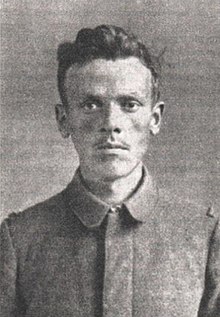Friedrich Schumann
This article needs additional citations for verification. (April 2018) |
Friedrich Schumann | |
|---|---|
 | |
| Born | Friedrich Schumann 1 February 1893[1] |
| Died | 27 August 1921 (aged 28) |
| Cause of death | Execution by beheading |
| Other names | Terror of Falkenhagen Lake |
| Criminal status | Executed |
| Conviction(s) | Murder (7 counts) Rape Burglary |
| Criminal penalty | Death |
| Details | |
| Victims | 7 |
Span of crimes | 1918–1920 |
| Country | Germany |
| State(s) | Berlin |
Date apprehended | 20 August 1920 |
Friedrich Schumann (1 February 1893 – 27 August 1921) was a German serial killer. He is also known as "Massenmörder vom Falkenhagener See" ("Terror of Falkenhagen Lake"). Schumann murdered seven people and raped 11 women. He was 28 years old when he was executed in 1921.
Murders
[edit]Schumann was born in 1893 in Spandau. His father had a long criminal record and suffered from alcoholism and his grandfather had been convicted of pedophilia. He bought his first gun at a young age, practising by shooting at the local wildlife. During his teenage years, he killed his female cousin, claiming that the gun accidentally went off while he was playing with it, spending some time at a correctional institution as a result. After completing his locksmith apprenticeship he was conscripted into the German army. He fought during the First World War, where he was awarded the Iron Cross 2nd class for his excellent marksmanship. Following the end of the war, he struggled to adjust to civilian life, embarking on his criminal career. Over the course of three years Schumann committed 7 murders, 15 attempted murders, 5 arsons, 11 rapes and a series of thefts and robberies.[1] On 18 August 1919 Schumann shot 52-year-old forester Wilhelm Nielbock from Spandau. On 20 August 1919, he was arrested in Berlin. The trial against Schumann started on 5 July 1920 in Berlin.
Trial and execution
[edit]Friedrich Schumann was convicted of murder, and on 13 July 1920, he was sentenced to seven death penalties, one life sentence, ten years hard labour and several other sentences in Berlin. He was, therefore sentenced to death.[2]
On 27 August 1921, at 6 o'clock in the morning, Schumann was executed in the courtyard of the Plötzensee Prison by Prussian executioner (Scharfrichter) Carl Gröpler, using the axe. The Berlin lawyer Erich Frey later recalled his brief encounter with the executioner: "At the end of the corridor, I had to give way to a broad-shouldered man. He looked like a transport worker; the high-buttoned formal jacket looked strange on him. His closely-cropped skull rested upon a bull neck. In spite of the faint light, he looked suntanned and healthy. Never before had I seen executioner Gröpler from Magdeburg. But as he passed me with a slight bow, I knew it was him. Anyone who had any business in the Criminal Court of Justice knew about Gröpler. He had been a horse butcher previously.... each month he collected a small fixed salary, and had in return to be ready with his massive axe and his three skilled assistants at the demand of the State attorney. For every execution, he received 300 Marks plus his expenses. Gröpler went in to see his customers.... "You can go to him [Schumann] with no trouble," I heard the guard say to Gröpler in Berlin dialect, "he's got no nerves."[3]
See also
[edit]References
[edit]- ^ a b c "Berlin - metropolis of crime 1918 - 1933 (1/2) DW Documentary". Deutsche Welle. 2 February 2019. Retrieved 15 February 2019.
- ^ Blazek, Matthias, Carl Großmann und Friedrich Schumann – Zwei Serienmörder in den zwanziger Jahren, Stuttgart 2009, p. 123.
- ^ Frey, Erich, Ich beantrage Freispruch. Aus den Erinnerungen des Strafverteidigers Prof. Dr. Dr. Erich Frey, Blüchert Verlag, Hamburg 1959, p. 40.
Bibliography
[edit]- Matthias Blazek (2009), Carl Großmann und Friedrich Schumann – Zwei Serienmörder in den zwanziger Jahren, ibidem-Verlag, Stuttgart, ISBN 978-3-8382-0027-9 (in German)
- Christopher Berry-Dee (2011), Cannibal Serial Killers: Profiles of Depraved Flesh-Eating Murderers, Amazon Kindle, ISBN 978-1-56975-902-8, p. 204
- Erich Hobusch (2003), Wilddieberei und Förstermorde – Originalfassung seiner Bücher aus 1928–31 von Otto Busdorf, edition I-III, Neumann-Neudamm, Melsungen, ISBN 3-7888-0725-3 (in German)
- Martin Lücke (editor) (2013), Helden in der Krise, Didaktische Blicke auf die Geschichte der Männlichkeiten pt. 2, LIT Verlag Berlin-Münster-Wien-Zürich, ISBN 978-3-8258-1760-2, p. 172 (in German)
- Daniel Siemens (2007), Metropole und Verbrechen. Die Gerichtsreportage in Berlin, Paris und Chicago 1919–1933, Franz Steiner Verlag, Stuttgart, ISBN 978-3-515-09008-7 (in German)
- Emil Utitz (1926), Jahrbuch für Charakterologie, Pan-Verlag, Berlin (in German)
- Richard Wetzell (editor) (2014), Crime And Criminal Justice In Modern Germany (Studies in German History), ISBN 978-1-78238-246-1, p. 222
External links
[edit]- Der Massenmörder vom Falkenhagener See, Märkische Allgemeine, 1 February 2013
- Carl Großmann und Friedrich Schumann – Zwei Serienmörder in den zwanziger Jahren, matthias-blazek.eu
- 1893 births
- 1921 deaths
- Executed German serial killers
- German Army personnel of World War I
- German people convicted of murder
- German people convicted of rape
- People convicted of murder by Germany
- People executed by the Weimar Republic
- People executed by Germany by decapitation
- People from Spandau
- Recipients of the Iron Cross (1914), 2nd class
